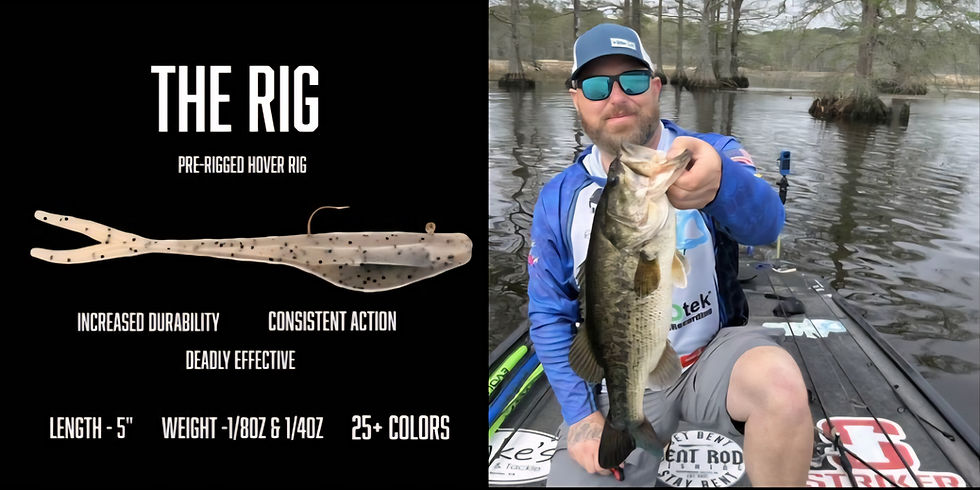What Makes Fishing Gear Durable and Reliable?
- Daniel Charles
- 2 days ago
- 5 min read
When I first got into bass fishing, I quickly learned that not all fishing gear is created equal. Some rods and reels just don’t hold up after a few trips, and that’s frustrating when you’re out on the water trying to land a big one. Over time, I’ve discovered what really makes fishing gear durable and reliable. It’s not just about spending a ton of money; it’s about knowing what to look for and how to care for your equipment. Let me walk you through the key factors that make fishing gear stand the test of time, especially if you’re using forward-facing sonar to find those bass.
Why Durable Fishing Gear Matters More Than You Think
Durable fishing gear isn’t just a luxury - it’s a necessity. When you’re out on the water, the last thing you want is your rod snapping or your reel jamming right when you hook a bass. Durable gear means fewer interruptions, less frustration, and more time enjoying the sport. Plus, it saves you money in the long run because you’re not constantly replacing broken or worn-out equipment.
Here’s what durable fishing gear really means to me:
Strength: The gear can handle the stress of fighting a big bass without breaking.
Weather resistance: It won’t rust or degrade after exposure to water, sun, and dirt.
Smooth performance: Reels turn smoothly, rods flex without cracking, and lines don’t snap easily.
Longevity: It lasts for years, even with regular use.
If you want to invest in gear that lasts, you need to understand the materials and design features that contribute to durability.

What to Look for in Durable Fishing Gear
When shopping for fishing gear, keep an eye out for these features that boost durability and reliability:
1. Materials Matter
The materials used in rods, reels, and lines make a huge difference. For example:
Rods: Graphite rods are lightweight and sensitive but can be brittle if not made well. Fiberglass rods are heavier but more durable and flexible. Many quality rods combine both materials for the best of both worlds.
Reels: Look for reels made with corrosion-resistant metals like aluminum or stainless steel. Plastic parts might save money but often don’t last.
Lines: Braided lines are strong and abrasion-resistant, making them great for heavy cover. Fluorocarbon lines are less visible underwater and resist UV damage.
2. Build Quality and Craftsmanship
Even the best materials won’t help if the gear isn’t well-made. Check for:
Tight, smooth reel bearings that don’t wobble.
Rod guides that are securely attached and made from durable materials like ceramic.
Handles that feel solid and comfortable, not cheap or flimsy.
3. Design for Your Fishing Style
Durability also depends on how well the gear matches your fishing habits. If you’re fishing in heavy cover or rocky areas, you’ll want gear designed to withstand abrasion and impact. For bass fishing with forward-facing sonar, you might need rods and reels that allow quick, precise casts and fast retrieves without sacrificing strength.
4. Maintenance and Care
Durable gear still needs some TLC. Rinse your gear with fresh water after every trip, especially if you fish in saltwater or muddy conditions. Lubricate reel parts regularly and store rods properly to avoid warping or damage.
5. Warranty and Customer Support
Good manufacturers stand behind their products. A solid warranty and responsive customer service can save you headaches if something goes wrong.
If you want to learn more about investing in quality fishing gear, check out trusted suppliers who focus on durability and performance.

What Brands Are Under Pure Fishing?
If you’re curious about the brands that fall under Pure Fishing, you’re in for a treat. Pure Fishing is a big name in the fishing industry, owning several popular brands known for their durable and reliable gear. Here are some of the key brands under their umbrella:
Abu Garcia: Famous for their high-quality reels and rods, Abu Garcia gear is built tough and designed for serious anglers.
Berkley: Known for innovative fishing lines and baits, Berkley products are trusted for their durability and effectiveness.
Fenwick: This brand offers rods that combine sensitivity with strength, perfect for bass fishing.
Shakespeare: Shakespeare provides affordable yet reliable gear, great for beginners and casual anglers.
Stren: Specializes in fishing lines that offer strength and abrasion resistance.
These brands have earned their reputation by focusing on quality materials, smart design, and rigorous testing. If you want gear that won’t let you down, checking out Pure Fishing’s lineup is a smart move.
How Forward Facing Sonar Changes Your Gear Needs
Using forward-facing sonar has changed the game for bass fishermen. It helps locate fish and structure ahead of the boat, making your fishing more efficient. But it also means your gear needs to keep up with this tech-savvy approach.
Here’s how durable fishing gear fits into the forward-facing sonar setup:
Quick response rods: You need rods that can handle fast, accurate casts when you spot fish on the sonar.
Strong reels with smooth drag: When you hook a bass quickly, your reel’s drag system must perform flawlessly to avoid line breaks.
Durable lines: Abrasion-resistant lines are essential because you might be fishing near rocks, logs, or vegetation revealed by the sonar.
Comfortable gear: Since you’re often adjusting your sonar and casting repeatedly, gear that feels good in your hands reduces fatigue.
Investing in gear that matches your forward-facing sonar style means you’ll catch more bass and enjoy your time on the water more.
Tips for Keeping Your Fishing Gear Durable and Reliable
Even the best gear needs some care to stay in top shape. Here are my top tips for maintaining your fishing equipment:
Rinse after every trip: Freshwater rinse removes salt, dirt, and debris that cause corrosion.
Dry thoroughly: Moisture can lead to rust and mold, so dry your gear completely before storing.
Lubricate moving parts: Use reel oil and grease to keep bearings and gears running smoothly.
Check line condition: Replace fishing line regularly to avoid unexpected breaks.
Store rods properly: Use rod racks or hangers to prevent bending or warping.
Inspect gear before trips: Look for loose guides, damaged reels, or frayed lines and fix them early.
By following these simple steps, you’ll extend the life of your gear and keep it performing like new.
Durable fishing gear is the backbone of every successful bass fishing trip. Knowing what materials to look for, understanding the brands that deliver quality, and maintaining your equipment properly will keep you ready for action. Whether you’re casting near cover or using forward-facing sonar to find your next big catch, reliable gear makes all the difference. So gear up smart, take care of your equipment, and get ready to reel in those bass with confidence!
Happy fishing!
.png)




Comments